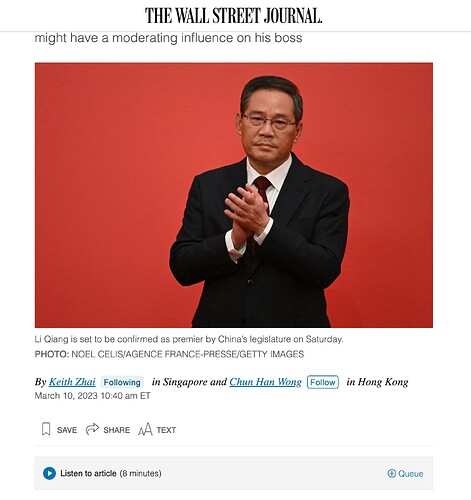-
中国即将上任的总理李强,显示出他不仅仅是中国领导人习近平的忠臣。
-
他在将中国从新冠清零措施中解放出来并将政府的重点重新放在经济增长方面发挥了领导作用。
-
这引起了谨慎的乐观情绪,认为他可能会对习近平施加温和的影响。
-
李强有可能影响这个世界第二大经济体的未来。
-
他曾担任过中国金融中心上海的党政领导。
-
他被称为是习近平的忠实拥护者,但也是亲商的实用主义者。
-
过去的中国总理对经济施加了巨大的影响。
-
李强正在进入一个在习近平领导下权力和威望都有所下降的角色,也就是中国总理。
-
即将离任的总理李克强,随着习近平的集权,他的影响力被削弱了。
-
中国宣布今年的经济增长目标为5%,表明从原始的经济扩张中转移出来。
-
李强总理在上任之前没有国家经验,被视为中国领导人习近平的 “唯命是从”。
-
李强在制定重要决策方面发挥了领导作用,并利用他与习近平的信任,收回了可能对经济造成更持久损害的政策。
-
去年年底,李强提前介入了中国从新冠疫情动态清零管制中抽身出来的行动。
-
他没有改变发展模式,也没有说服习近平带领大家重新进行市场改革。
-
李强在政府职位被正式确认之前就已经承担了新的职责。
-
李强于10月开始领导一个全国性的新冠疫情工作组。
-
习近平希望朝着重新开放的方向发展,但对这样做的速度持谨慎态度。
-
李强和他的同事们游说加快恢复经济的步伐,并利用习近平的自豪感,还引用了郭台铭的一封信,警告其对供应链的影响。
-
广东在新冠疫情控制方面测试了一种更有针对性的方法,与李强2022年春天在上海尝试的方法相似。
-
在大规模抗议新冠封控之后,广州取消了所有疫情限制。
-
一周后,中国在全国范围内取消了新冠清零措施。
-
李强展示了他与其他高级领导人有效合作的能力,努力寻找一条摆脱新冠清零的道路。
-
他在试图振兴中国经济的过程中也发挥了同样的技能。
-
李强总理和中国最高经济规划机构负责人何立峰起草了一份计划,从监管转向鼓励经济增长。
-
政府已经实施了促进住房供应和需求的措施,并放松了对互联网巨头的控制。
-
与李强及其同事关系密切的人已经向商界精英发出邀请,为私营部门提供支持,并试图劝说那些在大流行病期间离开的人回来。
-
一位与李强关系密切的政府高官最近试图向一家科技公司保证,政府已计划对中国的互联网行业实施 “积极政策”。
-
一位与新领导层关系密切的前官员试图说服一位外籍中国商人回国,提供稀有的上海大闸蟹,并承诺对私营部门提供支持。
-
李强继续热切支持习近平的一些政策重点,包括实现 "共同富裕 "的要求–一项旨在使中国更加平等的运动。
-
中国总理李强面临着一系列挑战,包括地方政府债务过高,生产力增长不足,以及人口快速老化,同时还要处理与西方贸易伙伴的紧张关系。
-
中国官员正准备让李强出席3月下旬的博鳌论坛,通过会见外国领导人来提升他的国际形象。
-
一些中国企业家对新政府的承诺仍持怀疑态度,担心新总理缺乏推动亲商政策变化的影响力。
-
一位外籍商人对国家的发展方向表示怀疑。
-
分析人士说,政府必须抓紧解决这些问题,以减轻和分配痛苦,否则将面临更多的社会矛盾。
-
李先生出席博鳌论坛可能有助于提高国际知名度,但不确定这是否足以说服企业家相信政府的承诺。
-
Li Qiang, China’s incoming premier, is showing to be more than just a loyalist to Chinese leader Xi Jinping.
-
He has taken a leading role in freeing China from zero-Covid and refocusing the government on economic growth.
-
This has given rise to cautious optimism that he may be able to exert a moderating influence on Xi Jinping.
-
Li has the potential to influence the future of the second-largest economy in the world.
-
He previously served as party chief in the Chinese financial center of Shanghai.
-
He is known as a Xi loyalist but also a pro-business pragmatist.
-
Past Chinese premiers have exerted vast influence over the economy.
-
Li is stepping into a role that has become diminished in power and prestige under Xi Jinping.
-
Li Keqiang, the departing premier, had his influence weakened as Xi centralized power.
-
China announced a 5% economic-growth target for this year, indicating a shift away from raw economic expansion.
-
Premier Li Keqiang comes into the job without prior national experience and is seen as a yes-man to Chinese leader Xi Jinping.
-
Li has taken a leading role in shaping important decisions and has leveraged his trust with Xi to roll back policies that might have caused more lasting damage to the economy.
-
Li waded in early to China’s pivot away from zero-tolerance Covid controls late last year.
-
He has not changed the development model or persuaded Xi to lead a charge back towards market reforms.
-
The State Council Information Office did not respond to a request for comment.
-
Li Keqiang has assumed new responsibilities before his government posts were officially confirmed.
-
Li assumed leadership of a national Covid task force in October.
-
Xi wanted to move towards reopening but was cautious about the speed at which to do so.
-
Li and colleagues lobbied for a faster rollback of zero-Covid, playing to Xi’s sense of pride and citing a letter from Terry Gou warning of the impact on supply chains.
-
Guangdong tested a more-targeted approach in Covid controls similar to one Li tried in Shanghai in the spring of 2022.
-
Guangzhou lifted all Covid restrictions after mass protests against zero-Covid.
-
China scrapped zero-Covid measures nationwide a week later.
-
Li showed his ability to collaborate effectively with other senior leaders in the effort to find a path out of zero-Covid.
-
He has brought the same skill to bear in trying to revive the Chinese economy.
-
Premier Li Keqiang and He Lifeng, the head of China’s top economic planning agency, have drafted a plan to pivot away from regulation and toward encouraging economic growth.
-
The government has implemented measures to boost housing supply and demand, and to loosen their grip on internet giants.
-
People close to Li and his colleagues have made overtures to the business elite, offering support for the private sector and trying to persuade those who had left during the pandemic to return.
-
A high-ranking government official close to Li recently tried to assure a tech firm that the government had planned to implement “positive policies” toward China’s internet sector.
-
A former official close to the new leadership tried to persuade an expatriate Chinese businessman to return with offers of rare Shanghai hairy crab and a promise of support for the private sector.
-
Li continues to offer fervent support for some of Xi’s policy priorities, including demands for achieving “common prosperity”—a campaign aimed at making China more egalitarian.
-
Chinese Premier Li Keqiang faces a number of challenges including excessive local government debt, lack of productivity growth, and a fast-aging population, while also navigating tensions with trading partners in the West.
-
Chinese officials are preparing for Mr. Li to attend the Bo’ao Forum in late March to boost his international profile by meeting foreign leaders.
-
Some Chinese entrepreneurs remain skeptical of the new government’s promises, worrying that the new premier lacks the clout to push through pro-business policy changes.
-
An expat businessman expressed doubt in the direction the country is going in.
-
Analysts say the government must grapple with these problems to alleviate and allocate the pain, or else face more social tensions.
-
Mr. Li’s attendance at the Bo’ao Forum may help to boost international profile, but it is uncertain whether it will be enough to convince entrepreneurs of the government’s promises.
链接:China Appoints Xi Jinping Loyalist Li Qiang as Premier - The New York Times
